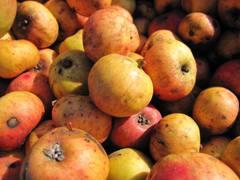News & Events
Latest News
Volunteer Programme April 2019 - September 2019
17.05.2019
Screening For Life Walk 01/07/2015
18.06.2015
Facebook Page
News
There are currently 60 stories.
Traditional Orchards in Wales: Call for Volunteers
19.03.2012

Once a common sight in the British countryside, orchards have now become rare and have been listed as a priority habitat for conservation. Since late last year, the North East Wales Orchard Recovery Project has been working to plant and restore orchards in North East Wales. The partnership is led by Flintshire County Council and North Wales Wildlife Trust, with support from Denbighshire County Council and Wrexham County Borough Council. In Denbighshire new orchards have been planted on five of our Countryside Sites. An Orchard Management Workshop was held on 10 March to educate new and existing orchard owners in the techniques required to successfully manage an orchard.
Castell Dinas Brān
07.03.2012
This year, staff from the Clwydian Range and Dee Valley Area of Outstanding Natural Beauty (AONB) will be tackling the increasing problem of camping and littering on the “Pancake” on Castell Dinas Brân. In recent years, the number of overnight parties being held here has increased dramatically, and the litter that is left is requiring more and more resources, from the AONB team, Council employees and local residents.
Trees disappearing in the Park
07.03.2012
The removal of the poplar from rivers edge looks particularly drastic but it is necessary. The poplar is a non-native species planted by Crosville 50 years ago. They have reached maturity and are being removed to allow the native ash to flourish. This will also open up more light to the woodland floor bringing a burst of wildflowers which will in turn attract insects including butterflies and bees.
Lesser Horseshoe Bats
07.03.2012
On the biodiversity section of the website you can now find a video of the Lesser horseshoe bats. This colony uses this roost in Bodidris Hall every year. The footage that gets recorded there is being analysed to improve our understanding of the behaviour of these bats.This bat is one of the smallest British bat species. They weigh between 5 and 9g, and the length of their body is between 35 and 45mm. It has a complex noseleaf to help with its intricate echolocation system. Click here to see our video!



